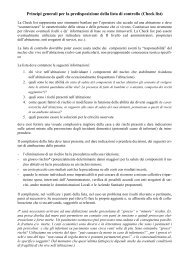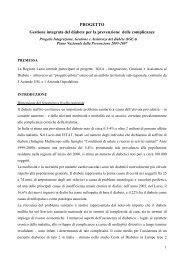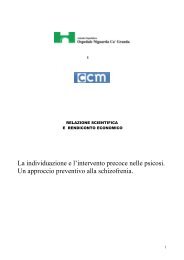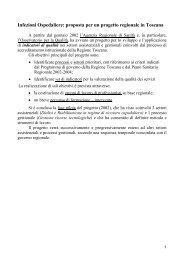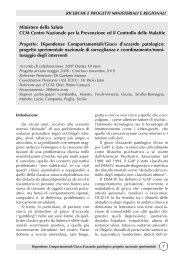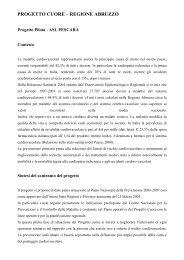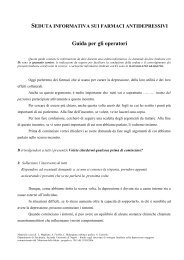Gaining health : analysis of policy development in European ...
Gaining health : analysis of policy development in European ...
Gaining health : analysis of policy development in European ...
Create successful ePaper yourself
Turn your PDF publications into a flip-book with our unique Google optimized e-Paper software.
One <strong>of</strong> the key opportunities for tackl<strong>in</strong>g social determ<strong>in</strong>ants<br />
<strong>of</strong> <strong>health</strong> would be a problem-centred approach<br />
comb<strong>in</strong><strong>in</strong>g social and <strong>health</strong> policies. There has been no<br />
harmonization at the level <strong>of</strong> government <strong>of</strong> actions <strong>in</strong><br />
social and <strong>health</strong> areas, not even when social and <strong>health</strong><br />
affairs belonged <strong>in</strong> the same m<strong>in</strong>istry. The traditional medical<br />
approach is socially <strong>in</strong>sensitive while the social sector is<br />
unprepared to tackle questions <strong>of</strong> <strong>health</strong>.<br />
Tak<strong>in</strong>g <strong>in</strong>to consideration the present characteristics <strong>of</strong><br />
<strong>policy</strong> <strong>development</strong> for tackl<strong>in</strong>g NCD, the key threats and<br />
challenges <strong>in</strong> the medium term are as follows.<br />
1. How can <strong>health</strong> and <strong>development</strong> be l<strong>in</strong>ked at national<br />
level <strong>in</strong> the National Development Framework (EU<br />
structural funds)?<br />
2. How can social and economic determ<strong>in</strong>ants <strong>of</strong> <strong>health</strong><br />
be tackled from a <strong>health</strong> promotion and disease prevention<br />
perspective to achieve better equality?<br />
3. How can <strong>health</strong> be put higher on the political agenda <strong>in</strong><br />
a period <strong>of</strong> <strong>health</strong> care reform?<br />
4. How can commitment be <strong>in</strong>creased and strategic<br />
susta<strong>in</strong>ability <strong>of</strong> policies ensured to tackle NCD beyond<br />
the government cycle?<br />
5. How can economic models be found for NCD prevention?<br />
6. How can one cooperate with the private sector <strong>in</strong> a<br />
strategic and ethical way?<br />
7. How can an <strong>in</strong>tegrated approach for the whole<br />
communication system be developed from a <strong>health</strong><br />
prospective?<br />
8. How can the fragmentation <strong>of</strong> strategy implementation<br />
be avoided?<br />
9. How can an <strong>in</strong>crease <strong>in</strong> human and f<strong>in</strong>ancial resources<br />
for NCD prevention and <strong>health</strong> promotion be ma<strong>in</strong>ta<strong>in</strong>ed<br />
<strong>in</strong> the light <strong>of</strong> current <strong>development</strong>s?<br />
5. Lessons from the Hungarian experience<br />
The epidemiological situation related to NCD is quite<br />
unfavourable by <strong>European</strong> standards, especially <strong>in</strong> the<br />
middle-aged population. Consider<strong>in</strong>g the economic <strong>in</strong>dicators<br />
<strong>of</strong> national <strong>development</strong>, the <strong>health</strong> status <strong>of</strong> the<br />
Hungarian population gives a much more negative picture<br />
than expected.<br />
In the last three decades, rich and <strong>in</strong>creas<strong>in</strong>g experience<br />
and know-how have been created <strong>in</strong> Hungary <strong>in</strong> develop<strong>in</strong>g<br />
policies to tackle NCD. Broad Health-for-All-type policies<br />
were developed from the late 1980s, supported later by a<br />
number <strong>of</strong> issue-specific sub-policies. This strategy, based<br />
on umbrella policies while develop<strong>in</strong>g more and more vertical<br />
programmes, does not <strong>of</strong>fer an appropriate level <strong>of</strong> coord<strong>in</strong>ation.<br />
In 2008, Parliament was to use the opportunity<br />
<strong>of</strong> the fifth anniversary <strong>of</strong> the NPHP to look at the situation<br />
and suggest ways for further <strong>development</strong>.<br />
5.1. The <strong>policy</strong> environment<br />
After beg<strong>in</strong>n<strong>in</strong>g with some CVD prevention programmes<br />
<strong>in</strong> the mid-1970s, Hungary developed a long-term Healthfor<br />
All-type <strong>policy</strong> for <strong>health</strong> promotion <strong>in</strong> 1987. This<br />
unique experience <strong>of</strong> the communist era was very largely<br />
<strong>in</strong>fluenced by the WHO Regional Office for Europe. After<br />
the fundamental political, economic and social changes <strong>in</strong><br />
1990, more conservative, medicalized approaches <strong>in</strong> public<br />
<strong>health</strong> became dom<strong>in</strong>ant, lead<strong>in</strong>g to a government resolution<br />
on the pr<strong>in</strong>ciples <strong>of</strong> a long-term public <strong>health</strong> <strong>policy</strong> <strong>in</strong><br />
1994. This programme has never been really implemented,<br />
however.<br />
At present, the key elements <strong>of</strong> the macro-<strong>policy</strong> environment<br />
<strong>in</strong>fluenc<strong>in</strong>g the chances <strong>of</strong> develop<strong>in</strong>g policies to tackle<br />
NCD can be summarized as follows.<br />
• The present Government undertook important new<br />
steps <strong>in</strong> <strong>health</strong> care reform. For politically understand-<br />
Chapter 4<br />
145<br />
Case studies: <strong>policy</strong> <strong>development</strong> <strong>in</strong> countries for tackl<strong>in</strong>g noncommunicable diseases



